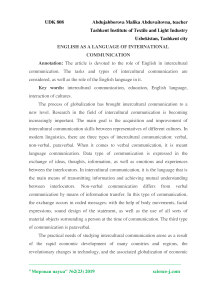English as a language of international communication
Автор: Abdujabborova M.A.
Журнал: Мировая наука @science-j
Рубрика: Основной раздел
Статья в выпуске: 2 (23), 2019 года.
Бесплатный доступ
In this article highlights of the magnitude of the spread of English and his importance for the development of modern society, main features of English as international language and the reasons for this phenomenon.
Foreign language, society, argot, culture, dialect
Короткий адрес: https://sciup.org/140264252
IDR: 140264252 | УДК: 808
Текст научной статьи English as a language of international communication
The process of globalization has brought intercultural communication to a new level. Research in the field of intercultural communication is becoming increasingly important. The main goal is the acquisition and improvement of intercultural communication skills between representatives of different cultures. In modern linguistics, there are three types of intercultural communication: verbal, non-verbal, paraverbal. When it comes to verbal communication, it is meant language communication. Data type of communication is expressed in the exchange of ideas, thoughts, information, as well as emotions and experiences between the interlocutors. In intercultural communication, it is the language that is the main means of transmitting information and achieving mutual understanding between interlocutors. Non-verbal communication differs from verbal communication by means of information transfer. In this type of communication, the exchange occurs in coded messages: with the help of body movements, facial expressions, sound design of the statement, as well as the use of all sorts of material objects surrounding a person at the time of communication. The third type of communication is paraverbal.
The practical needs of studying intercultural communication arose as a result of the rapid economic development of many countries and regions, the revolutionary changes in technology, and the associated globalization of economic activity. The density and intensity of prolonged contacts between representatives of different cultures have increased significantly and continue to increase. Studying the problems of intercultural communication, the features of the interaction of two cultures are traditionally considered, and their dissimilarity is of particular interest, since knowledge of the differences in cultural systems helps to overcome barriers to the effective interaction of peoples.
There are a number of parameters that determine the similarities and differences of cultures. One of the parameters is ethno-collectivism and individualism.
Knowledge of these differences, and most importantly, the correct interpretation of the behavior of a foreign interlocutor, will allow you to correctly build intercultural communication, as well as avoid conflicts and misunderstandings. Of course, knowledge of the language (in this case, English) is inextricably linked with familiarity with the culture of the language being studied, since only those concepts that are relevant to the speakers of a given culture and language are reflected in the language.
Researcher S. A. Karasev [2] argues that in the 21st century a new linguistic phenomenon may emerge - international English, which will embody the features of all national variants of the English language, which is promoted by the growing use of English in such areas as media, advertising , film industry, pop music, tourism, international business, international security (creation of unified language systems Seaspeak, Emergency Speak, Airspeak), education, international communications. Also, a special role at international conferences, symposia or meetings belongs to the English language, which is the language of international communication, the universal lingua franca, the intermediary language for communication between representatives of different language communities. One billion, that is, 20% of the total world population, speaks English. More than 75% of international correspondence (letters, e-mail) and 90% of information on Internet sites is in English.
English is actively used in advertising. According to D. Crystal, English has become the language of world communication in the field of business communication, since this language has simplified the exchange of messages between the ever-growing number of communicators around the world. It is noteworthy that in English-speaking countries in companies it is becoming increasingly popular to train employees in linguistic features of communication with foreign partners in order to increase the efficiency of business contracts. Speaking about the special role that English plays in international business communication, it should be mentioned that English is declared the official language of international and transnational corporations.
About 50% of companies in Europe communicate in English. As an example, Philips is a Dutch international company in which English was chosen as the language of communication, not Dutch. A similar situation is observed in the German company Porsche, where English was preferred to the German language, despite the fact that many Germans work in the company, as well as the fact that German itself is the language of global communication. Thus, we can conclude that English has become the most significant in intercultural communication. No international sphere of human activity passes without the “participation” of the English language. Nowadays, everyone needs to learn English, since it can be useful not only in business, but also in a simple evening walk.
Список литературы English as a language of international communication
- Antrushina G. B., Afanaseva O. V. Lexicology of the English language. - M., 1999.
- Arakin V.D. History of the English language. - M., 2001.
- Barkhudarov L.S., Shteling D.A. Grammar of the English Language. - M., 1973.
- Options for multi-literary languages. - Kiev, 1981.


